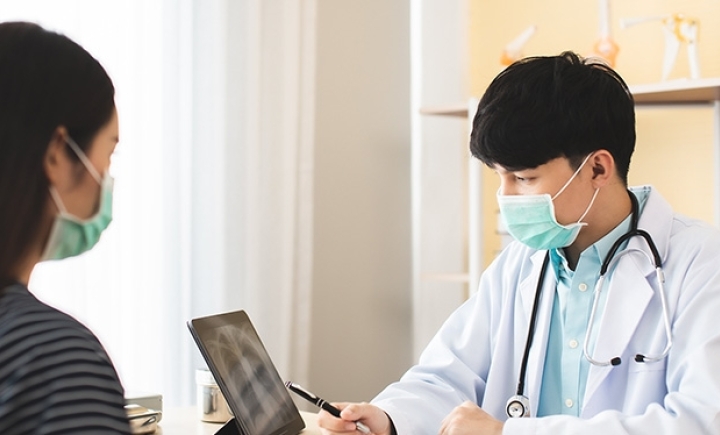Gastroscopy and Colonoscopy | Gastroenterology and Hepatology

Is there any benefit to regular gastroscopy and colonoscopy?
Do you often experience indigestion or abdominal discomfort? Gastroscopy and colonoscopy can help investigate the underlying causes. These endoscopic procedures allow direct observation of the stomach and intestines to detect abnormalities or diseases such as abnormal cell growth, ulcers, or polyps. If any lesions are found during examination, the doctor may use forceps attached to the endoscope to collect tissue samples for analysis. Early screening helps lower the risk of developing gastrointestinal cancers, including stomach, esophageal, colorectal, and anal cancer.
Many people think gastroscopy and colonoscopy only detect stomach and colorectal cancers, but in fact, they can identify a wide range of digestive conditions, such as the following:
What can gastroscopy and colonoscopy examine?
Gastroscopy examines the upper digestive tract, while colonoscopy examines the lower digestive tract.
Gastroscopy — examines the esophagus, stomach, and duodenum
A gastroscopy, or “upper gastrointestinal endoscopy,” allows doctors to examine the esophagus, stomach, and duodenum. It helps diagnose upper digestive tract diseases, such as stomach or esophageal cancer, gastritis, esophagitis, stomach ulcer, esophageal ulcer, duodenal ulcer, and stomach polyps. It is useful for evaluating symptoms such as difficulty swallowing, persistent abdominal pain, heartburn, acid reflux, or indigestion. If necessary, the doctor may take tissue samples to identify whether the condition is benign or malignant, and may remove polyps immediately during the examination.
Colonoscopy — removes polyps and prevents colorectal cancer
A colonoscopy examines various lower digestive tract conditions, including colorectal or anal cancer, inflammation, ulcers, vascular lesions, hemorrhoids, and suspected intestinal bleeding. It is recommended for patients with persistent abdominal pain, chronic diarrhea, constipation, or bloody stools to identify possible causes.
Even people without symptoms can undergo colonoscopy. In Hong Kong, colorectal cancer is the most common cancer, with over 5,600 new cases recorded in 2018. Most cases begin with benign polyps that can become malignant over about 10 years. Removing these polyps through colonoscopy can reduce the risk of cancer development.
How long does the procedure take? What preparation is required?
Colonoscopy
A colonoscopy uses a flexible scope inserted through the anus to examine the lining of the colon. The procedure usually takes 15 minutes to 1 hour. Sedatives and pain relief are often given so the patient remains relaxed or asleep. Three days before the procedure, patients should eat a low-residue diet and avoid high-fiber foods such as vegetables, fruit, and oatmeal. The day before, a bowel cleansing agent is taken to clear stool and ensure a clean view of the intestines for accurate examination.
Gastroscopy
A gastroscopy uses a thin, flexible tube about 0.9 cm in diameter with a camera at its tip, inserted through the mouth and esophagus to reach the stomach and duodenum. If required, the doctor may extract tissue samples through the tube for pathology testing. To ensure comfort, local anesthetic spray and intravenous sedation are provided. The procedure usually takes around 10 minutes.
When is gastroscopy or colonoscopy needed?
Gastroscopy indications
-
Difficulty swallowing
-
Persistent stomach pain, heartburn, acid reflux, or indigestion
-
Black or tarry stool
-
Unexplained weight loss
-
Iron-deficiency anemia (fatigue, low hemoglobin)
-
Family history of stomach or esophageal cancer
Colonoscopy indications
-
Colorectal cancer screening (recommended for people aged 45 or above, or with family history)
-
Blood or mucus in stool
-
Unexplained abdominal pain
-
Unexplained weight loss or fatigue
-
Changes in bowel habits (persistent constipation or diarrhea for more than 2 weeks)
-
Positive fecal occult blood test
Who should undergo these examinations?
Gastroscopy
Individuals with swallowing difficulties, recurrent upper abdominal pain, acid reflux, indigestion, upper gastrointestinal bleeding, loss of appetite, or weight loss may need a gastroscopy. People aged 40 and above are recommended to begin regular screenings, especially those with a family history of stomach cancer.
Colonoscopy
Besides those showing colorectal cancer symptoms, regular screening is advised from ages 45 to 50, as early colorectal cancer often has no obvious signs and is increasingly found in younger adults. If only a few polyps are found and test results are normal, repeat colonoscopy every 5 years is recommended. If multiple polyps (20–30) are present, the next screening should be done within a year.
For people with a direct family history of colorectal cancer or additional risk factors, screening should start earlier—at age 40 or 10 years before the relative’s age at diagnosis.




